- Home
- MariaLisa deMora
Watcher
Watcher Read online
Watcher
Rebel Wayfarers MC
Book #9
MariaLisa deMora
Edited by Hot Tree Editing
Cover image by Charles Thomas Rogers Photography
Cover model: Anthony Varrecchia
Cover design: Debera Kuntz
Copyright © 2016 MariaLisa deMora
All rights reserved. This book or any portion thereof may not be reproduced or used in any manner whatsoever without the express written permission of the publisher except for the use of brief quotations in a book review. This is a work of fiction. Names, characters, places and incidents are either the product of the author's imagination, or are used in a fictitious manner. Any resemblance to actual persons, living or dead, or actual events is entirely coincidental.
First Published 2016
ISBN 13: 978-0-9967486-7-4
DEDICATION
Whoever fights monsters should see to it that in the process
he does not become a monster. – Nietzsche
This book is for every person who skirts the fine line between citizen and outlaw. Those who are driven by circumstance and events to walk through shadows. Who by way of loyalty and love—with integrity and personal courage—strive to make a difference. There are more of us than you think.
Contents
Kentucky backwoods
New games
An honorable man
Target is clear
Drink me out of the country
Beat it back
Outrider years
Loyal to a fault
My grave
Lost and found in Mexico
Outside looking in
She’s damaged, brother
Everything I have
My Queen
Time of miracles and wonder
Give me what I need
What’s in your heart
Bikes are like livin’
Never again
Enemies and friends
Blowing shit up
Seven years
Soldiers and Rebels
Rise of the Diamante
Coulda mighta
Club. Family. Honor.
If it were me
Only for you
Escalation
Miracle twice over
I’ll give you everything
Uncommon name
Everything changes
Best laid plans
Time’s a passing
Changing of the guard
What comes after
And still
Thank you
ACKNOWLEDGMENTS
For any given book, there are scores more people involved in bringing it to publication than you might imagine. Of course, there are those who actively assist in every endeavor—photographers, editors, alpha and beta readers, graphic artists, and distributors. These people are important, and their roles are key. But frequently it is the behind the scenes folks who play just as critical a role, often without thanks.
People who provide inspiration through their actions, usually without realizing how they’ve impacted others. Individuals who become the conscience of the characters, and help shape the actions within the pages. This book is one of those, where the list of thank you notices could far outstrip the page count of the story.
Thank you to the gal at the concert who told me I looked amazeballs. That helped lead to Juanita accepting herself in ways that might surprise folks.
Thank you to the biker at the Veterans’ ride who complimented my riding. That helped give Carmela self-confidence to best her situation.
Thank you to the elderly veteran outside the southern Louisiana gas station. The pride you had in your service shone through our conversation, and I carried that with me all year.
Thank you to the co-worker who gave me a gigantic beer mug. It helps to know there are good people who have my back.
Every interaction helps build my world, and these in turn enrich the ones I’ve created in my mind. Thank you all.
I do have a few specific thanks to give. Bear with me, because these are important.
Thank you to all active military service personnel, and every veteran, man or woman, who served on home soil or overseas; to each hero who didn’t make it home; to all the families of those who serve. Thank you. You have my unending gratitude. I am humbled at the gift of sacrifice you have presented to all Americans.
An enormous thank you to Charles Thomas Rogers for capturing the image on the cover of Watcher. His work with Anthony Varrecchia was brought to my attention by a dear friend, and the swiftness with which everything fell into place meant this cover was destined to be. Anthony is amazing, and is as sweet and gracious a being as you could ever ask to meet. Also, a big thank you to Debera Kuntz for your talented ability to clarify my muddled ideas and bring them to life.
Becky Johnson and the gals at Hot Tree Editing have done a fabulous job, as always. I appreciate your willingness to go the extra mile to help shine my babies. XOXO
To my critique partners, Kristen, MirandaPanda, Kori, Jamey, and Kelsi: Thank you. Watcher is the better for your feedback. Plus, you didn’t kill me. So, bonus!
To the readers. You folks who vote with your wallet. The ones who read these stories and come back for more. Y’all rock hard. Miles of gratitude.
To my cadre of personal motorcycle men and women who have grown to be more family than friends, thank you. From the bottom of. Except Tinker. You’re still an ass. No, that’s neither a metaphor nor an allegory.
And, that’s it. Like I said, if I keep going, I’ll double the page count, and none of us want filler in front of this story. Y’all enjoy, yeah? Muuwah! <3
Woofully yours,
~ML
Kentucky backwoods
Fifteen-year-old Michael Otey stood at the top of the path, shoulders back, long arms relaxed at his sides. His ma promised he’d grow into his reach soon, said Mikey just had to be patient. From where he waited, right where the path doglegged sharply, he could see the pitch in the grade as the dirt track plunged down the steep mountainside towards the holler. He was watching his pa and one of their neighbors walk the trail that led towards the mine entrance. Not quite dawn, the early light streaming through the fog-filled air created odd shadows, making the men appear as dark silhouettes—featureless and eerie when glimpsed through the trees. His pa turned just before the path crooked at the bottom of the hill and waved, one long arm extending far over his head and holding there until Mikey waved back.
Next year Mikey would be pacing the same trail alongside them, taking his turn in the elevator to be deposited into the bowels of the earth. Not yet, though. His pa was adamant Mikey not take the burden on until he was at least sixteen.
Turning and jogging five long strides off the path and into the woods, Mikey oriented himself, then set off at a steady trot back home, staying off the path for this leg of the trip. Eyes down, he scanned the ground ahead and to either side, occasionally stopping to collect black morel mushrooms growing from the hillside. Practiced motions allowed him to leave the roots intact, the soft stems of the black and gray fungus falling to the pinching pressure of thumb meeting fingertip. Elbow tucked inside the bag slung over his shoulder, Mikey cradled the mushrooms in both hands as he opened the container and placed them inside. With a self-satisfied grin, he allowed himself a moment of pride at the haul he would be dropping on his mama’s table in about five minutes. Morels were a cash crop on a good week and a stew-stretcher on a bad one. She would be well pleased because most of the ‘shrooms were big and clean.
In the barn later that afternoon, he’d been working his way through the daily list of jobs, and was measuring out chicken feed. This was normally Tabby’s chore, but at only six, she was too short to reach th
e bottom of the barrel, and was prone to lean over too far, tipping herself inside. So, when it was nearly empty, as it currently was, dipping out a scoop or two of grain on her behalf was far easier than retrieving an angry little sister from the depths of the round prison. It hadn’t happened often, but for him even once was too much, so if he were in a place to do so, he would meet her in the barn of an evening and help fill her bucket. Mikey was head-and-chest inside the barrel, scraping down near the bottom, having tuned out her little voice ratchet-jawing away above him. Tabby was jabbering animatedly about a dolly she’d seen in the mail-order catalog and how her birthday was only four months away when he felt it come over him. A spine-tingling strangeness washing through the air like soot before a storm.
First was the stillness. It seemed like noises were caught on the wind like cottonwood seeds in a cobweb; the waves of sound suspended as if they were dust motes in a sunbeam.
Then Pa’s old mare squealed. The normally sedate horse kicked out hard at the walls of her wooden stall, the sounds she made both sharp and dull at the same time.
The earth underneath his feet stretched, jolting everything in the barn. It set the tools hanging from the long wall jangling discordantly against each other. Thinner metallic pings of hay tongs fighting against deeper gongs from shovels and rakes. Rattling and tumbling off the wall, falling in an awkward heap along the edge of the floor. Tabby’s voice, raised in a shout, quickly cut off. As fast as the ground had lifted, it seemed scarcely a breath later when it fell back into place, the shudder that accompanied it moving through Mikey’s bones, setting his teeth to aching as it tumbled him into the barrel headfirst. He pressed his hands to the sides of the container, legs kicking, arms working to edge himself backwards.
Finally, sound re-entered the world with a rush, coming with the faraway shrill racket of the emergency whistle three hollers over. Tinny and high-pitched when heard from his location, he knew if he were closer—when he stood under the tower during one of their monthly tests—the sound would beat like a fist, threatening to split his head down the middle with its ferocity. Tabby’s frightened questions echoed through the metal, words warped until they were unrecognizable. “Hold on,” he told her, shoving again and feeling the barrel’s metal lip bite into his waist. “Can’t hear ya, Tabby. Hold on.”
He had barely extracted himself from the barrel when Ma ran into view, coming to a halt in the barn doorway. Chest heaving from her sprint from the house, her eyes were wide and nearly as frightened as the mare’s, showing whites all around. “Mikey,” she half screamed, half yelled, “you see to Tabby. Imma goin’ to the mine.” She didn’t even wait for his response. She simply whirled on her heel then raced away, long legs eating the distance, toes flying out in front of her to punch down into the ground. Then her knee lifted and she hit her stride, the kick of her muscles driving her on again. He stood and stared at the slowly swinging door for a long time. Long after she was out of sight. Long after Tabby had gone quiet—questions lodged in her throat as the seriousness of what happened settled onto her. Long enough for the siren to cut off, winding down to a silence more painful than the whistle had been.
Something bumped into his hip, and he looked down to see Tabby had her face buried in his side, arms wrapped around his waist. Her grabbing him hadn’t registered, but the sight—her bucket, empty but still dangling from her arm, handle digging into her skin, swinging once again to tap lightly at his hip—broke him from the paralysis threatening to swallow him whole. Carefully peeling her off him, he took the bucket and dropped it into the barrel, then bent in and filled it. “Here you go, Tabs,” he said gently, straightening and holding it out. A taste of normal would help settle them both. “Go take care of the hens.”
She reached and took the bucket from his hands, her little arms strained with the weight. Still facing away from him, her words asked the empty doorway, “When’s Ma gonna be home?”
“I don’t know, Tabs.” Gaze on the same doorway, bereft of movement, stripped of hope, he repeated himself, underscoring his feelings of helplessness at the moment. “I don’t know.”
For days, the acrid smell of the explosion wafted around the mountains, carried up the valleys and hollers, riding on the breeze through the trees to the homesteads. Stiff-spined coal widows sat in the front rooms of their houses, starched collars and unsmiling faces accepting visits from friends and family. Most, like the Otey family, without a body to view. Houses like theirs often were less attended, avoided and ostracized in grief, because no coal-mining family wanted to think of the worst outcome. Death happened, in and out of the mines, so a roughly framed wooden box laid on the dining room table was inevitable. Something that happened to everyone eventually. In those cases, at least there was closure. The community knew what had transpired; they and the family mourned the death, and those left to their lives found ways to move on.
With the miners for whom body recovery was impossible, their families lived with the unknown. Stories flew through the community of miners rescued after what seemed impossibly extended periods of time. Days, weeks, months—the tales recounted the survival of men in America, Canada, Russia, China, and a dozen other countries. Wild and fantastic, or dark and gruesome by turns, the speculation quickly carried a sour note of raw desperation. For the children of those miners, the stories brought unearned hope. Any day might be the one where their pa walked back through the door. Or the next. Or the next. For the widows of those men—women who knew they were widows in truth whether the ones they called husband were dead yet, or slowly suffocating in a lightless, confined space as much like a coffin as anything—those stories carried unearned pain, dragging them out of sleep time and again, as their tongues held back screams beating against their clenched teeth.
One week after the cave-in, an exhausted Mikey walked towards the house from the barn, neck twisted so he could stare at a dust-covered automobile sitting in the large, barren front yard. Taking the two steps up the porch in one stride, he yanked the front door open and stumbled to a stop in the doorway. A man, short and stooped, dressed in a mismatched suit, stood in the center of the room, briefcase in hand. The gray jacket he wore had been made for a larger man, its fabric a shade lighter than the pants which looked to have been unevenly hemmed, showing the tops of his ankles. A hat, colored yet another slightly different gray, perched on his head, looked to be the only right-sized part of his outfit.
With a handkerchief pressed to his forehead, the man didn’t turn at the sound of the door opening. Nor did he shift his focus from Mikey’s mother who stood, arms folded across her waist. She was near the motionless wooden rocker, shoved back near the coal stove, cold and unneeded at this time of year. The man didn’t stop talking either, and Mikey heard him say, “…gone within three weeks, Mrs. Otey, unless we can come to…another arrangement.”
Her eyes stayed stuck on the company man, and Mikey watched as her spine straightened, giving her another three inches of advantage. That, on top of the two she held even when bowed by grief. Head high, his ma spoke words directed at the man, but aimed at her son. “Mikey, honey,” she said this softly, carefully, and he watched as the fingers of each hand dug into the flesh of her arms just below her elbows, steadying herself as she thought of instructions for a made-up errand. “Run to the creek, go up near the spring. Take Tabitha with you, son. I need a dozen crawdads. No less, not one. Bring me a dozen. We’ll do a boil tonight. I’ll show you how my people cook mudbugs.”
By her people, Mikey knew she meant her family down in Louisiana. Her sister had followed her up to Kentucky, found herself a mountain man three counties over, and stayed. So she did have a few folks in the area. But the bulk of her people were living in stilt houses perched on the edges of shallow bayous in an area near Baton Rouge. He’d always liked to go visit in the summer, the foreign sounds of their speech musical to his ears, their cooking spicy but good. Those visits introduced him to a whole different palate from what his ma had learned from Pa’s sister, h
ere in Kentucky. Mikey appreciated both sides of the spectrum but knew his mother liked making Pa’s favorite dishes for the smile it brought to his face.
Something with this man, this company man, wasn’t right. An uneasy feeling strummed Mikey’s nerves. He couldn’t put a finger to it, but more than the man’s jumbled-together clothing jarred Mikey to the bone.
Other than taking care of chores, as he’d been doing that morning, Mikey hadn’t been five feet from his mother’s side since the cave-in happened. Not five feet all through the waiting. Pacing the floor, two steps to her one, because she was that tall. He stayed close when the newspaper men shouted questions, turning a scowl on them when they wouldn’t stop. Stayed close during the memorial service, organized once the company decided they wouldn’t risk more lives to retrieve bodies buried by the mountain. Been at her side the whole time. Now she was sending him away. For crawdads. Ain’t right, he thought.
“Ma,” he said slowly, drawing it out as a careful question. Her eyes slid sideways, and when her gaze hit him, he felt the burden of every emotion she’d tried to hide from him and Tabby. Dark. Heavy. Sad. Bleak grief swept across her features and Mikey knew in his gut that this very moment she was making a life-changing decision. Had already made it, or she wouldn’t be sending him away. “Ma,” he said again, his still-changing voice cracking as he forced out the sounds.
At his voice, her face softened. Beauty hidden by the mask of grief surfaced for a moment, and she gave him a small smile, cheeks lifting as her mouth moved, curving. “Go on, now.” Voice quiet, she made a shooing motion with her hand. She turned back to the company man, so named in Mikey’s mind because that had to be what he was. Mismatched suit or not, he had one, which meant money. Mikey knew the house and land didn’t belong to them, but instead was part of a lease agreement between his pa and the mining company. Everything in the house had been purchased through the company store, credit taken out of his pa’s envelope to pay.

 An Embarrassment of Monsters: A Dark Romantic Suspense Novel (Alace Sweets Book 3)
An Embarrassment of Monsters: A Dark Romantic Suspense Novel (Alace Sweets Book 3) Seeking Worthy Pursuits: A Dark Romantic Suspense Novel (Alace Sweets Book 2)
Seeking Worthy Pursuits: A Dark Romantic Suspense Novel (Alace Sweets Book 2) The Gray Zone
The Gray Zone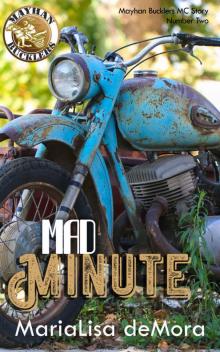 Mad Minute
Mad Minute Bet on Us
Bet on Us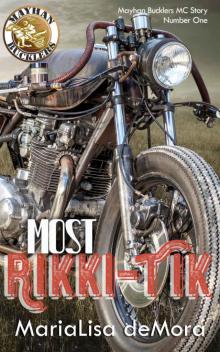 Most Rikki-Tik
Most Rikki-Tik Tangled Threats on the Nomad Highway
Tangled Threats on the Nomad Highway Tarnished Lies and Dead Ends
Tarnished Lies and Dead Ends Neither This Nor That Box Set 1
Neither This Nor That Box Set 1 See You in Valhalla
See You in Valhalla No Man's Land: A Rebel Wayfarers MC & Incoherent MC Crossover Novel
No Man's Land: A Rebel Wayfarers MC & Incoherent MC Crossover Novel Service and Sacrifice
Service and Sacrifice Rebel Wayfarers MC Boxset 3
Rebel Wayfarers MC Boxset 3 Rebel Wayfarers MC Boxset 4
Rebel Wayfarers MC Boxset 4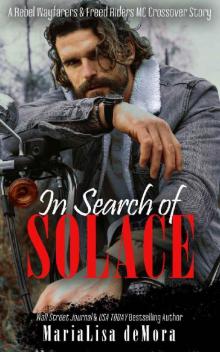 In Search of Solace (Rebel Wayfarers MC)
In Search of Solace (Rebel Wayfarers MC) Thunderstruck
Thunderstruck Gunny's Pups: #10.25 (Rebel Wayfarers MC)
Gunny's Pups: #10.25 (Rebel Wayfarers MC) Christmas Doings
Christmas Doings Gypsy's Lady
Gypsy's Lady Rules Are Rules
Rules Are Rules Not Even A Mouse
Not Even A Mouse Secret Santa
Secret Santa Duck (Rebel Wayfarers MC Book 8)
Duck (Rebel Wayfarers MC Book 8)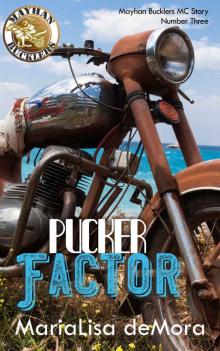 Pucker Factor
Pucker Factor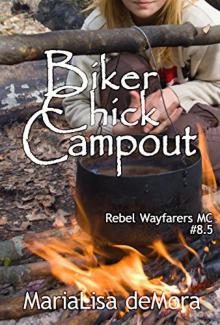 Biker Chick Campout (Rebel Wayfarers MC)
Biker Chick Campout (Rebel Wayfarers MC) Hard Focus
Hard Focus Slate (Rebel Wayfarers MC)
Slate (Rebel Wayfarers MC) Jase
Jase There Are Limits
There Are Limits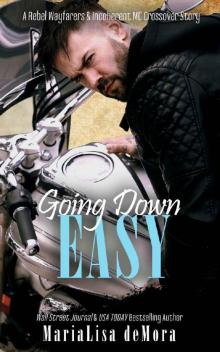 Going Down Easy: A Rebel Wayfarers MC & Incoherent MC Crossover Novel
Going Down Easy: A Rebel Wayfarers MC & Incoherent MC Crossover Novel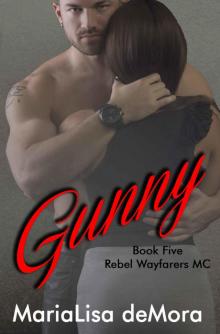 Gunny (Rebel Wayfarers MC Book 5)
Gunny (Rebel Wayfarers MC Book 5) Biker Chicks: Volume 2
Biker Chicks: Volume 2 A Sweet & Merry Christmas
A Sweet & Merry Christmas Bones (Rebel Wayfarers MC Book 10)
Bones (Rebel Wayfarers MC Book 10) Born Into Trouble (Occupy Yourself Book 1)
Born Into Trouble (Occupy Yourself Book 1) With My Whole Heart
With My Whole Heart Harddrive Holidays
Harddrive Holidays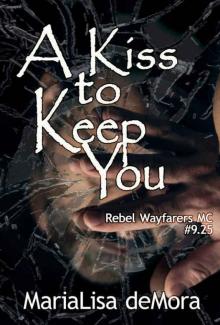 A Kiss to Keep You (Rebel Wayfarers MC Book 14)
A Kiss to Keep You (Rebel Wayfarers MC Book 14)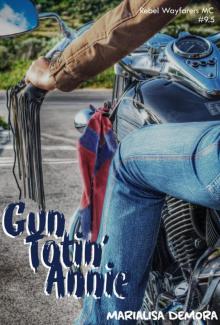 Gun Totin' Annie
Gun Totin' Annie Hoss (Rebel Wayfarers MC Book 7)
Hoss (Rebel Wayfarers MC Book 7) Mica (Rebel Wayfarers MC)
Mica (Rebel Wayfarers MC)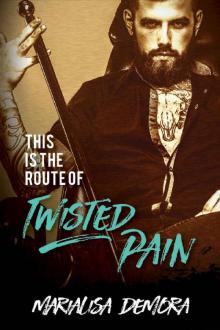 This Is The Route Of Twisted Pain (Neither This, Nor That Book 1)
This Is The Route Of Twisted Pain (Neither This, Nor That Book 1) Fury (Rebel Wayfarers MC Book 11)
Fury (Rebel Wayfarers MC Book 11) Watcher
Watcher